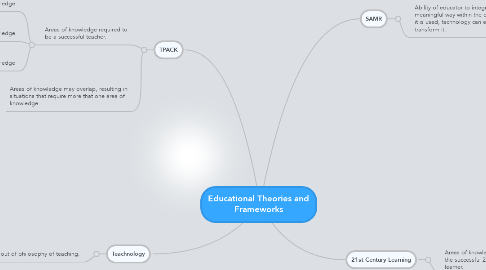
1. TPACK
1.1. Areas of knowledge required to be a successful teacher.
1.1.1. Pedagogical Knowledge
1.1.1.1. How an educator goes about teaching. Different approaches to teaching subject matter can make learning more conducive.
1.1.2. Content Knowledge
1.1.2.1. What the educator is teaching. This refers to the subject matter.
1.1.3. Technological Knowledge
1.1.3.1. Relates to knowledge of technology, how it is used, and how it may be integrated in the classroom to maximize learning.
1.2. Areas of knowledge may overlap, resulting in situations that require more that one area of knowledge.
2. SAMR
2.1. Ability of educator to integrate technology in a meaningful way within the classroom. Depending on how it is used, technology can enhance learning, or, ideally transform it.
2.1.1. Enhancement
2.1.1.1. These tools may assist or enhance learning, but don't alter the way students think and learn about content.
2.1.1.1.1. Substitution
2.1.1.1.2. Augmentation
2.1.2. Transformation
2.1.2.1. Using technology in a transformative manner rethinks how learning is accomplished and encourages teachers and students to approach content differently.
2.1.2.1.1. Modification
2.1.2.1.2. Redefinition
3. Teachnology
3.1. Evolved out of philosophy of teaching.
3.1.1. How technology should be used within the class to supplement teaching practices.
4. 21st Century Learning
4.1. Areas of knowledge required for the successful 21st century learner.
4.1.1. Foundational Knowledge
4.1.1.1. Core Content
4.1.1.2. Digital & Information Literacy
4.1.1.3. Cross-Disciplinary
4.1.2. Meta Knowledge
4.1.2.1. Problem Solving & Critical Thinking
4.1.2.2. Communication & Collaboration
4.1.2.3. Creativity
4.1.3. Humanistic
4.1.3.1. Life & Job Skills
4.1.3.2. Cultural Competence
4.1.3.3. Ethical & Emotional Awareness
